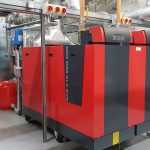The commercial heating sector will be going through a huge change over the next few years. As the government is regulating a shift away from the traditional gas boiler, taking us all into a low carbon future.
Commercial heating installers are well aware of options such as electric heat pumps coming onto the market. But while new buildings can be designed for and installed with heat pump heating and hot water systems, it is a different story for the millions of existing properties; not all of which are suitable for a heat pump-only approach.
One option we have been looking to is the hybrid approach to heating and hot water provision. A heat pump is installed to heat a buffer vessel which supplies the heating and hot water when its above 7°C outside. The gas boiler will then kick in when the outside temperature drops below 7°C to back up the heat pump and provide the extra heat loss.
This allows the heat pump to be sized smaller as it only needs to bring the heating up to temperature from 7°C not -3°C saving on space and the initial outlay cost.
The hybrid system works equally well with a heat pump and LPG, or oil boiler, which means it is a good option for off-gas grid premises too.
This approach has several benefits. It increases the efficiency of the heating system as heat pumps gradually become less efficient as outside temperatures drops as there is less heat available to take from the atmosphere. Buildings with lower insulation levels, or high heating needs can benefit from retaining a boiler to provide a boost to the heating system during times of peak demand; in cooler months, for example.
Perhaps one of the most important benefits of a hybrid boiler/heat pump approach is that the system can be set up to switch automatically between fuels, selecting the most efficient. Given the current situation with energy price rises, most property owners will benefit from a system that provides their hot water and heating at the best price all the time.
A further factor is that installing a hybrid option allows the use of existing radiators, whereas switching entirely to a heat pump heating system is likely to require an upgrade to larger and more efficient radiator models to ensure the system operates effectively.






